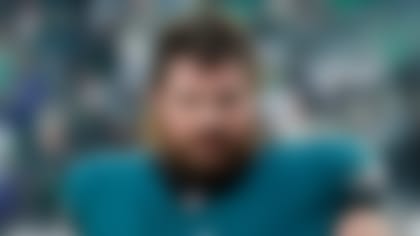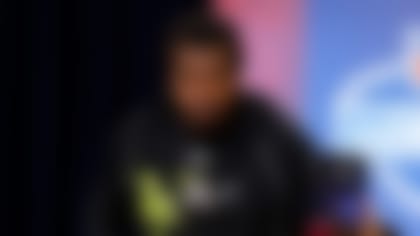Though the activism, protests and discussion that have swept the United States -- and beyond -- are very much due after centuries of racial inequality and injustice, the current movement truly was ignited on May 25 in Minneapolis.
It was then and there in which George Floyd was killed while in police custody.
It's also home to the Minnesota Vikings. But for players such Ameer Abdullah, Eric Kendricks and Kyle Rudolph, being Vikings on the field has very much taken a backseat to using their voices and platforms to bring about change to racial inequality, systemic racism and police brutality.
In the latest round table discussion hosted by NFL Network's Steve Wyche Tuesday night on NFL Total Access, Rudolph, Kendricks and Abdullah voiced their thoughts, and a common thread was that things are indeed moving in the right direction, but the discussion and action must continue and the NFL can be a guiding force in bringing about said change.
"The NFL holds great power," Abdullah said. "Every kid wants to be Kyle Rudolph. Every kid wants to be Eric Kendricks. Can't say they all want to be Ameer Abdullah. I hope so, I hope so for sure. Just understanding that influence that we have on the youth and how malleable the youth are with picking up on things and understanding empathy as opposed to sympathy, like what Kyle spoke about, I feel like the league can really carry that torch. We can really spark a real psychological change in this nation.
"A great influencer or a great organization like the NFL, has a great opportunity to seize this and to push the movement forward through action. And obviously, listening to what NFL Commissioner Roger Goodell said about before he wasn't listening to athletes' voices enough, that's great. Acknowledging that is the first step. But the next step I think is organizing with each individual team.
"I think we have a great responsibility that can really move this movement a lot further, a lot faster, if we seize that."
Abdullah was a member of the Detroit Lions in 2017 and took a knee during the national anthem to call attention to police brutality. He expects a similar reaction for any upcoming in-season protests in terms of fans being disgruntled. However, he has seen a large change in the current protests with more diverse gatherings. That, in addition to other factors, has him believing the movement is upon the right path.
"I participated in a few protests, I live in Atlanta, Georgia, I participated in a few protests down there. What I did see was, it was, there was a lot more diversity in those protests than in the past. Where before this was completely seen as a black issue, right, and people are starting to understand this is a human issue. When I protested back in 2017 during the national anthem, when Kaepernick first started taking a knee, I got a lot of push back, got a lot of push back. A lot of people who I thought were in my corner, kinda flipped on me. Of course, some fans were very harsh towards me because of that. I would say to the people who are intending to protest this year, expect a lot of the same. But what we have to do is understand that awareness is the goal. It's not to upset people. It's not to be an individual or stand away from your team, it's about bringing awareness to a real issue that's been persisting in this country for hundreds and hundreds of year," Abdullah said. "To make a physical demonstration, to bring awareness towards that, I think is a respectful act, as long as it's peaceful, of course. But, expect a lot of resistance. But like I alluded to earlier, before you can have peace, there must be war. And war doesn't always mean fighting and bullets flying. Sometimes it's just a war between words. A war between social groups. I think ultimately we're moving in the right direction, though."
Kendricks concurred.
"I agree with Ameer. These issues are important. We must start talking about them. We must continue them. It's about awareness. It's about knowing what our history truly is. It's crazy how we didn't learn about any of this stuff growing up in school. Hopefully now we start to see more dialogue in elementary schools regarding this. We've got to keep it going. We've got to keep the dialogue going. We've got to keep the awareness high."
Kendricks, who said he met with Commissioner Goodell on Monday, believes understanding what protesting was in regards to is a good first step, but more is needed.
"Just that dialogue alone is showing you that we are on the right path and we are trying to find solutions," Kendricks said. "But it goes deeper than just acknowledging what the protesting was for; it goes deeper than that. We've got to now start to put black people in leadership positions throughout the NFL.
"It's a issue that we're dealing with across the nation and I'm glad it's addressed."
For Rudolph, he thinks progress can likewise be seen in an understanding and a sharing of feelings, rather than simply feeling sorry for the plight of those who are being victimized by racism.
"When this issue translates from people being sympathetic to people being empathetic, that's where we're going to see change," Rudolph said. "Our owners, as Ameer said, are sitting in these meetings. They're listening to the stories these guys are telling. And they're becoming empathetic. Thus, giving us immense support: both financially and through their actions. And I think, as Eric just said, through dialogue, I believe our entire league can be empathetic through these tough times."
Within the thoughts and words of Rudolph, Abdullah and Kendrick, there's optimism to be found that these tough times are leading to better times. And the NFL can be an accelerator of positive change.












